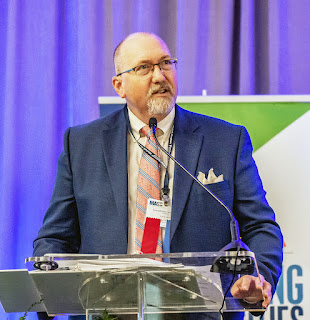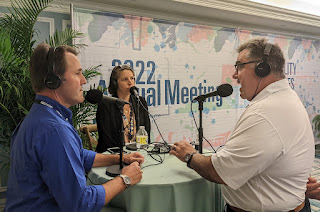Reviewing the past year
Many of the Annual Meeting sessions have presentations and recordings now available on the Association’s website.
Delegates from across the state’s cities and towns elected Aiken Mayor Rick Osbon as the new president of the Municipal Association of SC during the 2022 Annual Meeting.
In accepting the presidency (audio available here), Osbon recalled his election as mayor in 2015, and wanting to learn more about municipal governance.
“I knew I wanted to learn more about the Municipal Association and get involved in the many education and training opportunities that they offer us. I was impressed,” he said. “And when you elected me to the board of directors, I learned even more about the services of the Association and what it offers to our cities and towns. It's this level of service and added value that I want to continue and even expand in this upcoming year.”
He also called attention to the Association’s expansion of its federal advocacy efforts. In the past year, he has joined Association staff in Washington, D.C., to meet with the state’s U.S. senators and representatives to build positive relationships.
“It’s this spirit of cooperation with other stakeholders where we have seen so many legislative successes this year,” he said.
The Association’s advocacy team used its Annual Meeting session to review the new makeup of the General Assembly, the outcome of the 2021-22 legislative session and the municipalities’ advocacy efforts (audio available here).
Rock Hill Councilmember Kathy Pender, the Association’s outgoing president, also called attention to the Association’s accomplishments in the past year (audio available here), including collaborating with local and state officials on American Rescue Plan funding, and the addition of a new Association field services manager to help answer local questions.
Association Executive Director Todd Glover called attention to some of the Association’s initiatives relating to the other major priorities (audio available here). This included workforce development, where the upcoming Build the Bench program will aim to increase the number of qualified city managers and administrators available in South Carolina.
The economic development priority includes numerous projects, like the Recruitment Training Program, through which 26 cities and towns so far have learned the steps to successfully pull in new businesses to locate in their community. The City Connect Market, meanwhile, is a cooperative purchasing program that plugs into a nationwide network and allows South Carolina’s municipalities to use the purchasing power of more than 700 other governments. An upcoming initiative, We Shop SC, will provide an e-commerce platform for all Main Street South Carolina communities, through which local businesses can pay a small monthly fee to sell their products online.
Civility. Respect. Solutions.
Glover introduced some of the individual features of the Association-wide civility initiative. This includes the civility pledge, crafted both in a longer form that councils can use in a resolution, and a short personal pledge that can be used in contexts like meeting agendas. Find the text of the civility pledges and other resources here.
“We have to get to a point where we can disagree without being disagreeable. That if we’re on opposite sides of an issue, that we're not enemies,” he said. “We have to restore vision to our communities and get everyone behind that vision.”
Matt Lehrman, co-founder and managing director of Social Prosperity Partners, served as the keynote speaker, discussing not only how to build productive conversations in government instead of conflict, but even how to engage with stakeholders who are less engaged with the process (audio available here).
When officials create meaningful connections with their constituents, they can help everyone achieve more, Lehrman said, because “where people work together courageously, their potential is unlimited.”
Kathy Pender’s address focused on civility as well, noting that leaders in every part of the state have faced incivility and a lack of respect in council meetings and community interactions, she said.
“Even when it’s tough and frustrating, keep listening and talking with your colleagues and your residents. Don’t become one of those elected officials who only respond to their friends and the like-minded. Be willing to learn from one another. Our communities, our towns, our cities deserve that, and they will be stronger as we get better at engaging others in meaningful dialogues,” she said.
Annual Meeting podcasts
City Quick Connect podcast regulars Casey Fields and Scott Slatton set up a recording booth in the lobby of the Annual Meeting to discuss civility and professional development with various guests and presenters. They recorded episodes on both Thursday and on Friday.
Achievement Award videos
During each Annual Meeting, the Association recognizes superior and innovative efforts in local government with the Achievement Awards. See the videos highlighting this year’s winners, from Edisto Beach’s first-ever master recreation plan to Aiken’s downtown stormwater relief project.






